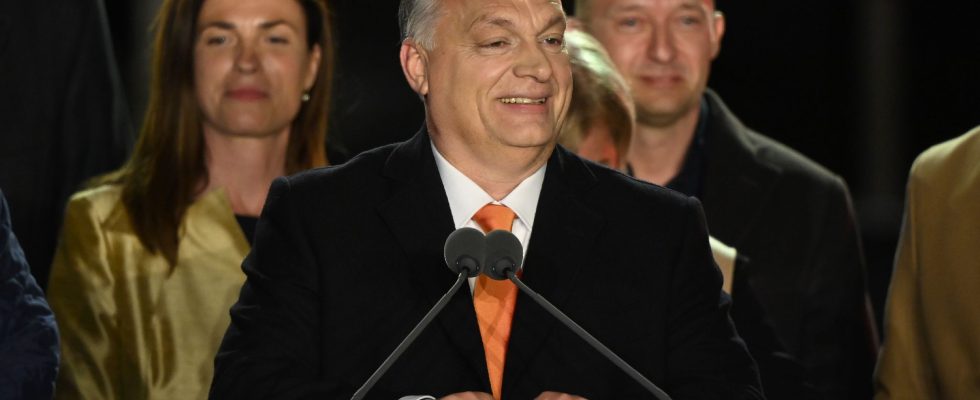In mid-February, Viktor Orban sent an explicit message to economic players during a speech before the Budapest Chamber of Commerce and Industry. “We need foreign capital because we are not strong enough. […] But at the same time, Hungarian ownership must be strengthened.” Telecommunications, mass distribution, insurance and construction: the Prime Minister of Hungary then pointed to four strategic sectors, where the foreign share exceeds the “desired level”.
The “strengthening” of Magyar control targets in particular German companies, which are strongly established in the country. The bosses of two Germanic cement companies, Heidelberg Materials and Schwenk Zement, were contacted by someone close to Orban who explained to them that they wanted to get their hands on Duna-Drava Cement Kft., their joint Hungarian subsidiary. Coincidentally, three recent decrees complicate the work of this company: it now pays a 90% extraction surcharge, can no longer export without prior permission and must comply with the volumes set by the government.
The case of Duna-Drava Cement Kft. offers a striking insight into the Orban method, documented in an investigation by the German weekly Der Spiegel. Act 1: put pressure on companies deemed undesirable by subjecting them to untenable requirements and regulations. Act 2: transmit buyout offers from businessmen taking advantage of the largesse of power. “A perfect strategy to accentuate the influence of the state on the economy while allowing the Prime Minister to help his most loyal supporters”, notes the magazine.
Gunther Krichbaum, European policy spokesman for the CDU Christian Democrats in the Bundestag, bluntly accuses Viktor Orban of employing “mafia methods” to drive German companies out of Hungary. Processes particularly favoring the Prime Minister’s own father, Gyozo Orban, who already supplies the asphalt and concrete for many road infrastructures, or Orban’s childhood friend, the oligarch Lorinc Meszaros, a former heating engineer who became the the country’s first fortune thanks to a timely windfall of public contracts, financed for the most part by European funds.
An “organization” of business
Long pampered, German companies are feeling the tide turn. New taxes, price freezes and more frequent inspections are shaking up the activities of Lidl and Aldi. “Big companies like Mercedes and Bosch believe it is not yet time to speak out, but small and medium-sized companies are complaining about an increasingly worrying business and economic environment,” the weekly said. Magyar LVH German Green MEP Daniel Freund.
Last August, the Hungarian telecoms giant 4iG, led by an associate of Lorinc Meszaros, took over the local branch of the British operator Vodafone with the state. Two trusted men of Antal Rogan, Orban’s chief of staff, now hold key positions in the general staff. At the end of March, the Hungarian state and its armed financial arm Corvinus International Investment continued the raid by buying from 4iG the 25% stake that the operator held in Yettel, the mobile subsidiary of the Norwegian Telenor. And it is this same coupling – State / Corvinus – which won 45% of the local subsidiary of the Dutch insurer Aegon a year ago. A French retail champion is also in the sights. Entrepreneur Daniel Jellinek, another friend of Viktor Orban, now owns 47% of Auchan’s Hungarian branch (24 stores) through his Indotek ZRT group, which also owns around 30 shopping centers in Budapest as well than in the provinces.
If the “organization” of business is accelerating, this economic nationalism remains no less skilfully selective. The Magyar leader thus takes great care not to alienate the colossal German automobile industry, the pillar of Hungarian GDP. The Rheinmetall behemoth manufactures military vehicles in Zalaegerszeg. After Audi in Gyor, Mercedes in Kecskemet and Opel in Szentgotthard, BMW has said it is ready to invest 2 billion euros in its Debrecen plant by 2025. In addition to sedans, the Bavarian firm will produce electric batteries. Like the Chinese group CATL, allied with Mercedes, which plans to build a gigacomplex on the outskirts of the second city of the country, on the way to becoming the future European hub of the genre. As for the Koreans Samsung and SK Innovation, they are also surfing on the boom in batteries by extending their Magyar sites, with the blessing of Budapest.
China managed by Orban
China, a major foreign investor, is also spared. It is associated with the largest intermodal rail terminal in Europe, opened in October 2022 near the Ukrainian border. Beijing is also overseeing the modernization of the Belgrade-Budapest railway line, the keystone of the new Silk Roads intended to facilitate the transport of goods from the Greek port of Piraeus, itself under the Chinese flag since 2008. to the difficulties of the Russian supplier Rosatom, Hungary is also considering support from the French Framatome for the Paks nuclear power plant.
After having fought for a long time to preserve his corporate tax at 9%, the lowest in Europe, Viktor Orban finally agreed to adopt the minimum rate of 15%, soon to be applicable to all countries of the European Union. The billions of euros in subsidies that the EU has frozen so far will be able to flow. And the Hungarian workforce, one of the cheapest in Europe, is working hard to make this external capital grow, which CEO Orban so badly needs.
